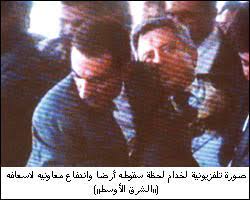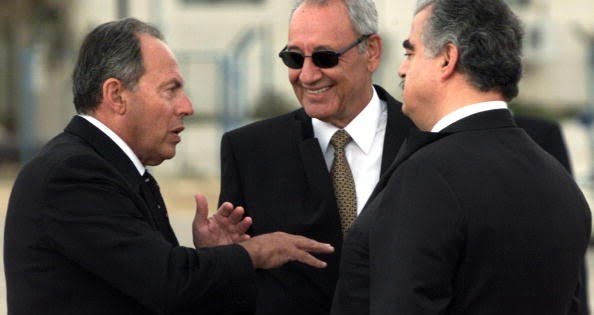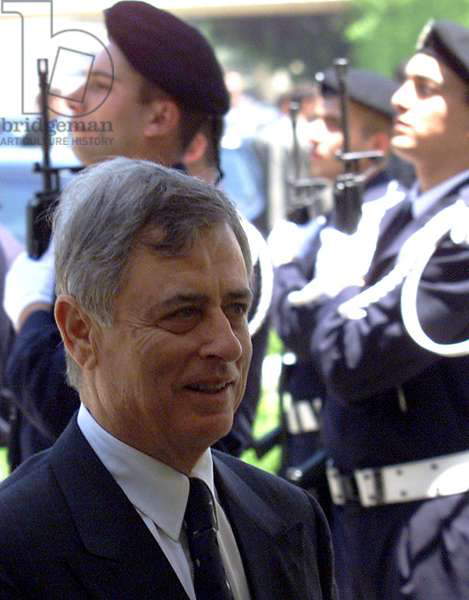The festival began with a speech by one of the organizers who praised the virtues of the late President Karami. He said, “Just a few days ago, you celebrated the first anniversary of your victory over the Israeli enemy and the achievement of the withdrawal from most Lebanese territories. This victory was not only yours but a victory for the entire world. Today, Lebanon commemorates the fourteenth anniversary of the martyrdom of a great man who gave much of his heart, mind, and body. His martyrdom was his ultimate sacrifice for Lebanon, for the Arab world, and in resisting the Zionist project. Between these two events, the event of martyrdom and the event of victory, Arab Lebanon stands proudly with its national unity, proud of its triumph, determined to continue on the path until the great victory is achieved – the great victory of Lebanon’s revival, its launch, and the victory of the Arab nation over the Zionist project.”
“The event of victory was achieved thanks to your resilience, sacrifices, and the heroism of those who dedicated themselves to their homeland, choosing to live the words of the Quran: ‘And never think of those who have been killed in the cause of Allah as dead. Rather, they are alive with their Lord, receiving provision.’ As for the event of martyrdom, it was for the unity of Lebanon, for the realization of civil peace, and to stop the bloodshed, and to confront the Zionist project in Lebanon. President Rashid Karami sacrificed himself while pursuing peace for his fellow citizens, justice, and equality for his fellow citizens, and to see Lebanon liberated, strong, and dear, with no Israeli occupier tainting its soil. His role was significant in bringing down the Seventeenth of May Agreement, which legitimized the Zionist project and could have torn Lebanon apart and destroyed its independence.”
“The martyr, along with leaders of the national movement, played a pivotal role in the downfall of this agreement and in liberating Lebanon from the grip of such agreements that only bring humiliation to the Arabs. Any agreement that does not stem from the rights of the Arabs is an agreement of humiliation for all Arabs.”
He added, “In his martyrdom, the martyr was among the first in the caravan of Lebanon’s martyrs. The strife was lurking behind his assassination. However, the Lebanese people, in realizing the motives behind the attempt to assassinate the martyr, recognized the danger posed by the enemies and held onto their national unity. In doing so, President Rashid Karami contributed with his blood to putting an end to the bloodshed in this sisterly country… He confronted extremism with moderation and combated violence with dialogue. He distanced extremism from his beloved city, returning only after it had regained its security. Extremism killed him, and Lebanon lost one of its prominent figures. He rejected the idea of one group’s victory over another because in internal conflicts, the victor is defeated, the broken is defeated, and the entire country is defeated. Winning one side in internal conflicts means undermining national unity in a war marked by fanaticism, ignorance, and fueled by hatred.”
“Arab Lebanon was in his conscience, Arabism was in his beliefs, and Syria was in his heart. He inherited from his late father, President Abdul Hamid Karami, his national and patriotic principles, and his approach to moderation and his steadfast commitment to values and principles in his struggle for national peace. He was resolute in upholding principles and flexible in dialogue. In all the crises that Lebanon witnessed since the martyr entered the political arena, he was never a staunch party to these crises. He poured his national spirit into his stance, realizing that deepening it during crises would lead to the country’s stability. He was patient with opponents, so as not to sever the cord of dialogue and friendship, for a country does not stabilize or recover in the midst of conflicts and disputes.”
Khaddam continued, saying, “Discussing the period during which the martyr lived does not mean reopening the pages of the past, but rather extracting lessons and wisdom, fortifying the present, and illuminating the path to the future. In all countries that have experienced internal wars, their national unity was torn apart and still remains so. Lebanon alone was able to rise and reclaim its unity. It is upon you, my brothers, to continue the journey of recovery and strengthen national unity. Be vigilant, O brothers in Lebanon, regarding your national unity, as it is your fortress and the path to your resurgence. Strive to rid yourselves of all the ignorant legacies. Religion and sect should not be weapons exploited by infiltrators, climbers, and opportunists to protect interests or gain benefits. True faith does not call for fanaticism and sectarianism. Walk the path of faith in God, love for the homeland, and sincere dedication to it, for in faith lies tolerance, love, the call for justice and fairness, and equality. It is in faith that the mind is enlightened and action is taken.”
“Avoid fanaticism, for fanaticism obscures the mind, blinds one’s vision, misguides the path, and leads to destruction. Your only enemy benefits from division and discord among you, so do not present a gift to the enemy at the expense of national unity and the security of the country.”
Khaddam said in the second part of the speech, which he was unable to deliver due to the disruption that occurred, “Let dialogue be your path, for contention breeds tension, and tension hinders progress. Do not let disputes push some of you towards undermining the state, thinking that they are scheming against us, as in the end, everyone loses, and difficulties increase. Let your dialogue be better, and reject the bad with the good, for this is what I am doing to ensure the success of the dialogue.”
He continued, “Lebanon has always been at the heart of Syria and at the heart of the Arab nation. Rise up, my brothers, cooperate, and stand together, for that is for your benefit and for the benefit of your nation. Support your country with its constitutional institutions, for they are your fortress. Know that a state with deficiencies or gaps is a thousand times better than its absence, as the absence of the state turns society into a jungle where the strong prey on the weak, and the citizen becomes a stranger in his homeland or far from it.”
He called for not reopening the wounds of war and urged, “Tend to what remains of the wounds so they do not fester and the body weakens and loses its immunity.”
He added, “You achieved a victory over aggression, and the enemy withdrew from most of the Lebanese territories it occupied. However, the conflict continues, and for the continuation of the conflict, there are requirements. The first of these is to strengthen national unity and achieve progress, as well as to establish broader frameworks of cooperation between you and Syria, a cooperation that played a role in achieving victory.”
He continued, “The Israelis have not yet realized that the use of force does not bring peace or security. History is full of examples.”
He added, “The importance of your victory against Israel lies in its withdrawal from most of the land. This victory has created an atmosphere in Palestine that has strengthened the belief in the ability to confront, and it has boosted hope for achieving liberation and establishing the Palestinian state.”
He said, “Now is the time, my brothers, for Arabs to accurately assess the Arab-Israeli conflict and realize that the danger threatens the entire nation, as it targets parts of it, and that the entire homeland is at risk.”
He continued, “I don’t want to discuss Syrian-Lebanese relations and their centrality for Syria and Lebanon, nor do I want to talk about the achievements of these relations, including the achievement of civil peace, the restoration of the state to its role, the victory of the resistance, and the liberation of most of the occupied Lebanese territories. I also don’t want to discuss the prospects of these relations in protecting our mutual interests and ensuring these interests, or the advantages that these relations can enhance for the benefit of our peoples. These relations are in the conscience of the two fraternal peoples and will remain so because it is the will of God.”
He emphasized, “These relations took a new direction under the leadership of the late President Hafez al-Assad, a direction that prioritized Lebanon and its national unity, security, stability, and progress. Lebanon, our twin brother, we cherish it, and we believe that what brings good to one of us benefits the other, and what brings harm to one does not spare the other.”
“In the three decades under his leadership,” he continued, “he worked to strengthen the bonds of friendship and brotherhood and cooperation among all Lebanese, without distinction or discrimination. The issue of Lebanon, the issue of civil peace, and the building of the state and its institutions were among the most important issues that occupied him. Under the leadership of President Bashar al-Assad, Syria will continue on the same path, the path of brotherhood, cooperation, and solidarity.”
He concluded, “Syria’s hand is extended to all Lebanese, for the good of Lebanon and the good of Syria. Syria today, as it was in the past, will always be with Lebanon and with all Lebanese, without distinguishing between one brother and another, except for what distinguishes itself in serving Lebanon.”
“Read well, O brothers, you will find in Syria the loving brother who is eager for your well-being, your progress, your security, and your independence.”
“To the martyr whose commemoration has brought us together on this day, rest assured that your brothers and fellow citizens have drawn inspiration from the meaning of your martyrdom. They have struggled to achieve your goals. Peace be upon you as you reside in the gardens of eternity.”



